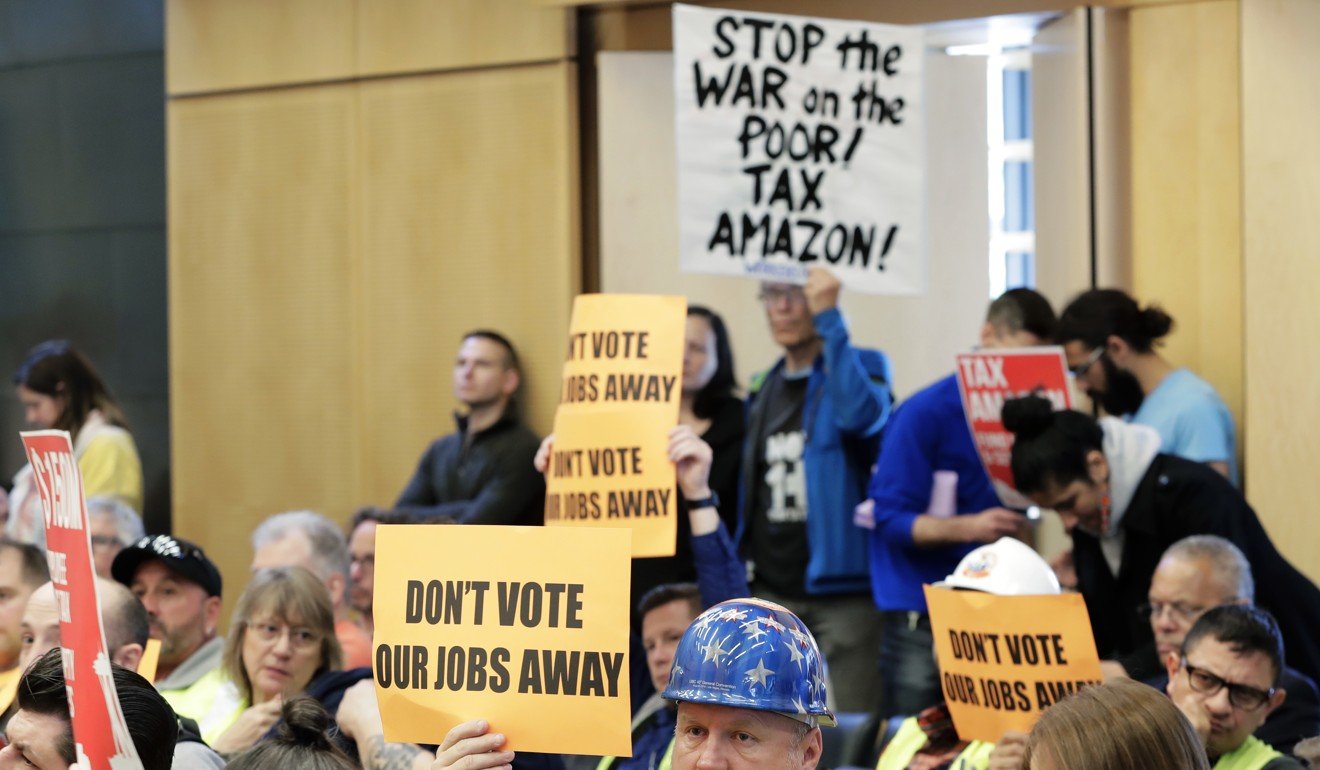
Amazon will find it hard to follow on threat to leave Seattle even as city imposes tax on large firms
Despite being upset by the city’s plan to levy a head tax that could cost it about US$12.5 million a year, there are no signs to suggest that the tech giant is about to pack up and leave its hometown
Despite Amazon’s threat to scale back in Seattle after the city enacted a head tax, it could be costly for the giant retailer to retreat from its hometown.
The company, which has more than 45,000 employees in Seattle, has amassed an equally gargantuan real-estate footprint during a decade-long office-space shopping spree.
Based on average office rents in the greater downtown area, Amazon’s office rent bill is likely north of US$200 million a year – far more than its estimated US$12.5 million bill under the head tax. It would be a herculean task to empty a big chunk of that space and find new tenants, real-estate industry sources say.

There is little to suggest Amazon is putting such plans into action yet. In the month since Amazon first suggested it would consider slowing its growth in Seattle, the company has posted ads for more than 1,200 jobs based in the city, a pace similar to the company’s feverish hiring of recent years.
“They have a lot invested,” said Brian Hatcher, executive vice-president at the Kidder Mathews commercial real-estate brokerage in Seattle. “Amazon has a bunch of people here already, they all have families and lives here. I just don’t think they’re going to pick up and leave, or scale back.”
When the City Council voted in May to implement a tax on large employers, Amazon said the “hostile” attitude from the council caused it to question its expansion here, raising the prospect that Seattle’s engine of economic growth might stall or go into reverse. The company has not elaborated on its thinking in the weeks since, though it did back an initiative to repeal the levy by popular vote in November.
But an analysis of Amazon’s footprint, based on conversations with real-estate industry sources, technology executives and corporate recruiters, highlight the challenges the giant retailer would face if it opted to scale back. While Amazon has options, including subleasing space and shifting new job openings elsewhere, they could be costly to implement in the short term.
Amazon has about 6 million square feet of leased office space now – roughly 60 per cent of its total footprint here – with plans for more, including more than 1 million sq ft worth of future leases that it has already signed.
Amazon has a bunch of people here already, they all have families and lives here. I just don’t think they’re going to pick up and leave, or scale back
The company does not disclose its office-lease terms, but most significant office leases in Seattle span at least seven years. Leases at brand-new buildings, which Amazon favours, are usually around 10 to 15 years. Amazon began moving into most its leased space in the last few years, so the company is likely on the hook to pay the bulk of its office rent through at least the middle of next decade.
That means Amazon would have to sublease its space if its plans change, and the company would face uncertain demand.
Starbucks, Zillow, Redfin, F5 Networks, Expedia, Weyerhaeuser, zulily, Tableau, Safeco, Facebook and Google could all double their presence in Seattle and still would not come close to filling the 7 million sq ft of office space that Amazon has committed to under its leases. Some of those companies have expanded their presence in Seattle in the first place to poach employees from a growing Amazon.
In reaction to the head tax, Amazon floated the idea of subleasing space at the future Rainier Square tower it agreed to lease last fall. That could be difficult.
The 722,000 sq ft in that project represents more class A office space than any company in Seattle currently occupies, and is equivalent to nearly half of the space leased in large deals in all of 2017 by companies other than Amazon, according to data from the Broderick Group, a commercial real-estate broker.
Unless a huge out-of-town company moves in, Amazon would have to chop the building into several subleases and hope to piece together enough tenants to fill the building, Hatcher said.
The stakes would be high: based on office rents for other new skyscrapers that have opened recently, Amazon’s bill for Rainier Square figures to be about US$35 million a year, or about triple the company’s annual burden under the head tax at its current size.
And then there’s the other 3.6 million sq ft of office space that Amazon owns, which includes portions of a six-block stretch of South Lake Union between Westlake Avenue and Fairview Avenue, as well as the company’s two purpose-built towers near the Amazon Spheres. Another million sq ft is on the way, most of it in the form of a third, nearly identical tower.
Amazon could sell some of that space. But the sight of Amazon even trying to sell would likely make the land less valuable as it raises questions about the durability of the local technology boom the company helped start.
“That’s a pretty daunting task, and if they did go down that road, it would really be a long-term process,” said local developer Jake McKinstry. “It’s extremely cost prohibitive to say that they would relocate their campus tomorrow, just for the sake of doing it.”
Amazon declined to comment on its plans.

